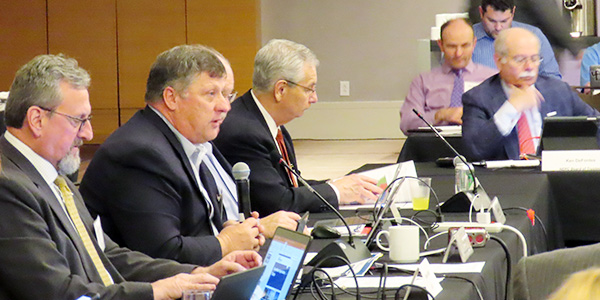NERC’s Reliability and Security Technical Committee took a number of actions in a two-day meeting this week.
DER Standard Request Denied
The committee rejected a standard authorization request (SAR) to revise reliability standard TPL-001-5.1 (Transmission system planning performance requirements). The SAR was proposed by the System Planning Impacts from Distributed Energy Resources (SPIDER) Working Group based on a white paper endorsed by the RSTC at its meeting in October. (See “Consent Agenda Items Approved After Debates,” NERC RSTC Briefs: Oct. 14, 2020.)
Only 19 of the 31 members present voted to endorse the SAR, short of the two-thirds majority required for passage; eight voted against endorsement, while four abstained.
Several members said that while they agreed with the need to update NERC’s standards to account for the growing penetration of distributed energy resources (DER), the decision to put forward a SAR seemed premature. For example, David Jacobson of Manitoba Hydro reminded the committee that it had only just voted to endorse the guideline for verifying aggregated DER models the same day and warned that starting the standards development process without reliable data and models seemed to put the “cart before the horse.”
Brian Evans-Mongeon of Utility Services Inc. raised several questions for SPIDER Chair Kun Zhu of MISO: first, whether the working group intended for the proposed changes to take effect before July 2023, the enforceable date of TPL-001-5.1; second, why the SAR did not specify its applicability to non-bulk electric system devices; and third, whether SPIDER and the Inverter-based Resources Performance Working Group (IRPWG) deemed MOD-032-1 (Data for power system modeling and analysis) sufficient “to provide the necessary data collection to support … these planning assessments.”
In response to the first and third questions, Zhu told Evans-Mongeon that the groups had not taken “specific … positions” on the issues he raised; on the second, he said “the applicability [of the existing standard] doesn’t change” with regard to non-BES devices. Evans-Mongeon suggested that more revisions were needed to make the SAR “ready for prime time.”
“I just think that there’s additional clarification and the need to eliminate confusion as we move forward … and I just feel that this SAR does not go far enough,” Evans-Mongeon said. “I think it can be expanded upon [and] can be improved, but right now I just don’t think it’s ready … especially if we’re looking at something that’s not going to be enforceable for two-plus years.”
The vote not to endorse the SAR does not mean the effort to revise TPL-001-5.1 is dead, as SPIDER can bring the proposal to the Standards Committee without endorsement. However, Howard Gugel, NERC’s vice president of engineering and standards, recommended that because members agreed on the importance of the project, the committee should try to work with the group to address their concerns.
“Since the RSTC, or its predecessors … authorized this group to begin its work [and] is now saying that it shouldn’t proceed, there should be some specific information … provided to this team” to help rework the SAR into an acceptable form, he said.
Approvals
Members approved scope documents and work plans for several of the RSTC’s subcommittees, working groups and task forces. Included were the scopes for the Performance Analysis Subcommittee, Event Analysis Subcommittee, Security Working Group and Standing Committees Coordinating Group, as well as the scope and work plan for the Energy Reliability Assessment Task Force (ERATF).
The RSTC also approved its own work plan, comprising “consolidated and updated” subgroup work plans.
The ERATF documents were approved with an amendment proposed by Evans-Mongeon regarding language in the draft that would allow the task force to “evaluate whether [SARs] are needed to enhance existing or create new reliability standards” to address potential fuel assurance concerns. His amendment allows for the issuance of reliability guidelines or the use of other NERC processes that might “get something out there quicker and more effectively … to help the industry along.”
Two reliability guidelines — “Model verification of aggregate DER models used in planning studies” and “Battery energy storage systems and hybrid power plant modeling and performance” — were approved as well, as was a white paper on possible misunderstandings of the term “load loss” developed by the System Analysis and Modeling Subcommittee in 2020.
The committee also endorsed a special assessment on the performance of NERC’s Energy Management System (EMS), intended to “gain a better resolution on the contribution of EMS outages to the loss of situational awareness risk and the effect of [reliability standard] EOP-004-4.”
Subgroups Disbanded
The committee agreed to disband two of its subgroups this week: the Security and Reliability Training Working Group (SRTWG), formed last year by the merger of the Reliability Training Working Group (previously part of the now-defunct Operating Committee) and the Security Training Working Group.
RSTC Vice Chair David Zwergel of MISO said the committee had concluded that this group is neither relevant to the RSTC’s mission nor necessary in the broader sector.
“We went back and looked over what the SRTWG was doing and looking at its deliverables. It’s really redundant with other efforts in industry as a whole,” Zwergel said. “It’s not that the RSTC doesn’t endorse or support training. It’s really [that] the training that this group was doing [was] focused on how to be a trainer, how to improve training techniques, [which is] covered elsewhere.”
Also shuttered was the Geomagnetic Disturbance Task Force (GMDTF), which last year concluded its two-year effort alongside the Electric Power Research Institute (EPRI) with the publication of EPRI’s white paper Research Findings for Geomagnetic Disturbance Research Work Plan. As recommended in the task force’s final report, the RSTC agreed to add GMD monitoring to the scope of the Real Time Operating Subcommittee.







